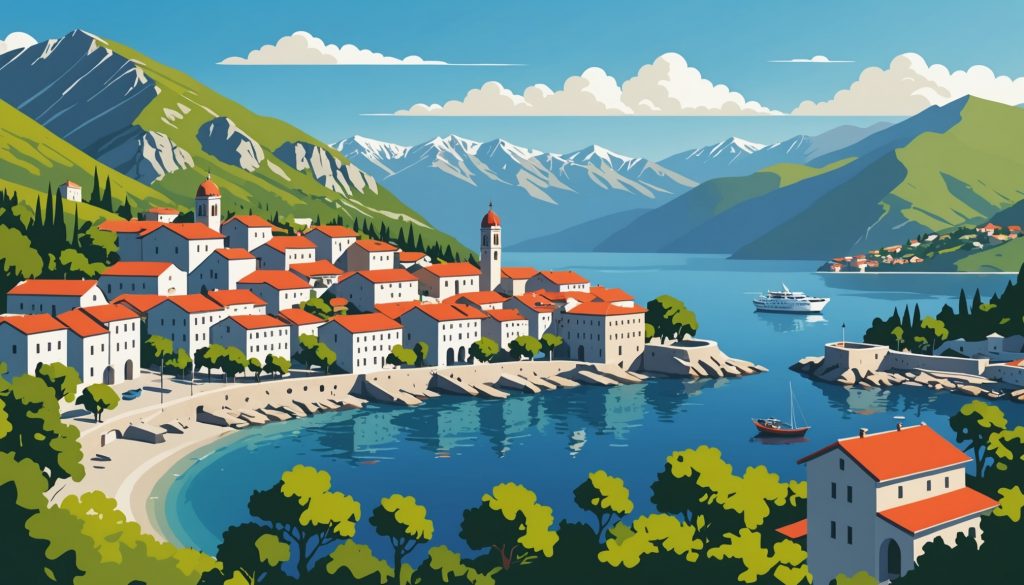Exploring Real Estate Investment Opportunities in Montenegro
Estimated Reading Time: 7 minutes
Key Takeaways
- Growing Market: Montenegro’s real estate market is projected to reach approximately $24.68 billion by 2025, fueled by the booming tourism sector.
- High Rental Yields: Expected rental yields in prime coastal areas such as Budva and Tivat range between 5-7%, depending on property quality and location.
- Favorable Ownership Laws: Foreigners can purchase most types of property with minimal restrictions, although agricultural land may necessitate company formation.
- Tax Benefits: Property transfer tax is relatively low (3% for existing properties), and double taxation agreements with several countries may ease tax liabilities for investors.
- Investment Risks: Market liquidity can vary, particularly in rural areas; investors should remain cognizant of regional political risks that could impact returns.
Table of Contents
- Market Overview
- Investment Trends & ROI Projections
- Legal & Tax Considerations
- Property Types & Prices
- Risks & Challenges
- Financing & Mortgage Options
- Citizenship/Residency Benefits
- FAQ
Market Overview
Montenegro’s real estate landscape is significantly influenced by its thriving tourism sector. High-profile projects such as Porto Montenegro and Porto Novi have stimulated demand for both residential and commercial properties, especially in coastal areas.
Key Market Indicators:
- Projected Market Value (2025): ~$24.68 billion
- Demand Trends: Increasing preference for properties with modern amenities and scenic views.
- Property Types in Demand: Luxury homes, vacation rentals, and new residential apartments.
Investment Trends & ROI Projections
The interplay of economic growth, robust tourism, and government support signifies a healthy outlook for real estate investments in Montenegro.
Expected Returns:
- Rental Yields: Estimated between 5-7% annually for well-located tourist-oriented properties.
- Price Trends: After significant increases post-2022, price growth is forecasted to stabilize in 2025, with minimal fluctuations expected.
Factors Influencing ROI:
- Tourism Growth: Continuous influx of international visitors bolstering rental demand.
- Local vs. Global Demand: Varied demand driven by local residents and international investors seeking holiday homes or retirement properties.
Legal & Tax Considerations
Foreign investors enjoy a favorable legal environment when it comes to property acquisition.
Ownership Rights:
Foreigners are allowed to purchase property with limited restrictions. Direct ownership of agricultural land may require establishing a local company.
Tax Structure:
- Property Transfer Tax: 3% for existing properties; VAT at 21% for new builds.
- Annual Property Tax: Ranges from 0.25% to 1% based on municipality.
- Capital Gains Tax: 15% on profits from property sales.
- Rental Income Tax: Fixed at 15% on net rental income.
- Double Taxation Agreements: Help mitigate tax burdens for investors from various countries.
Property Types & Prices
As of early 2024, property prices vary significantly by region and type.
Price Overview:
- Average Price for New Builds: Approximately €1,936 per m².
- Luxury Coastal Areas: Higher prices in cities like Budva, Kotor, and Tivat.
- Rental Market: Strong demand for both short-term and long-term rentals depending on the location.
Popular Property Types:
- New apartments in tourist districts
- Renovated traditional homes
- Commercial properties in urban centers
Risks & Challenges
Montenegro’s market presents both opportunities and challenges that investors should consider.
Potential Risks:
- Market Liquidity: Varies—strong in urban and coastal areas, weaker in rural locations.
- Regulatory Changes: Potential for new laws impacting real estate investments, especially in tourism zones.
- Geopolitical Factors: Fluctuations in international travel and regional conflicts could affect demand and property values.
Financing & Mortgage Options
Investors generally encounter a robust but cautious financing environment.
Financing Landscape:
- Local Banks: Offer financing but usually require down payments of 30-50%.
- International Lending: More stringent terms for non-residents.
- Cash Purchases: Remain a common approach among foreign buyers.
Citizenship/Residency Benefits
Investing in Montenegrin real estate presents opportunities for residency.
Residency Options:
- Temporary Residence Permit: Available to non-EU investors who purchase real estate, renewable annually.
- Citizenship: The formal citizenship-by-investment program ended in 2022; however, legal residency after several years may lead to citizenship under certain conditions.
FAQ
- Can foreigners buy property in Montenegro?
Yes, foreigners can purchase most types of property in Montenegro with few restrictions. - What are the taxes associated with property investment in Montenegro?
Investors should expect a property transfer tax (3% for existing properties), annual property tax (0.25% – 1%), and capital gains tax (15%) on sales profits. - Are there risks to investing in Montenegro’s real estate market?
Yes, risks include market liquidity fluctuation, political and regulatory uncertainties, and potential impacts from global tourism trends. - What regions in Montenegro are best for investment?
Cities such as Budva, Kotor, Tivat, and the capital Podgorica offer promising investment opportunities due to strong rental yields and many amenities.
Montenegro’s real estate market in 2025 offers a range of promising investment opportunities, particularly in coastal regions and high-quality developments. Investors should proceed with due diligence and remain informed of evolving legal frameworks to maximize returns.
For more information on your investment journey, visit Realty Invest Navigator.

